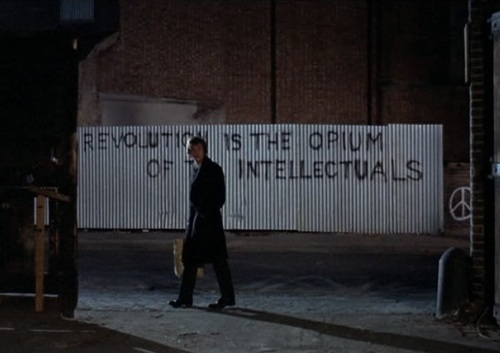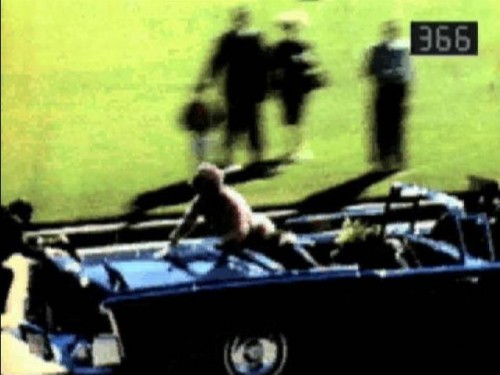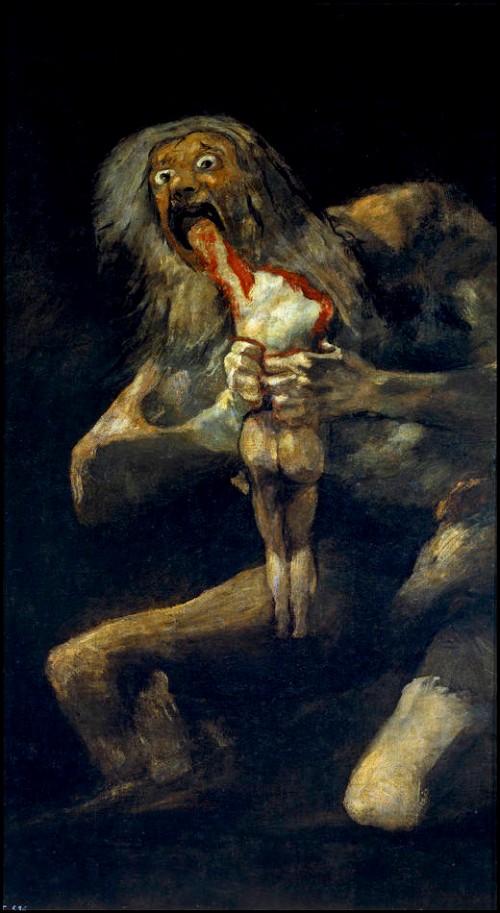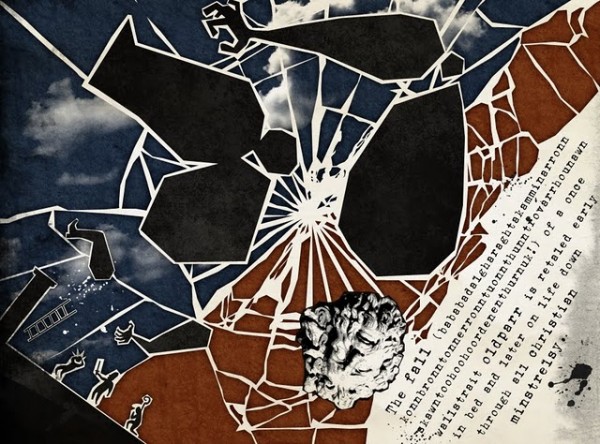Mess Section (umm)
Eight Mess Section
Sixth Mess Section

1. Alone, for one moment. –directions to performers from Erik Satie
2. Lutgardis, mystic. Born at Tongeren in 1182, died at Aywieres in 1246. Lutgardis’s family fobbed her off on a Benedictine nunnery when she was still a girl. In her mid-twenties she decided that she needed a more austere existence and so joined a group of Cistercian nuns near Brussels. There she levitated and dripped blood from her forehead and hair. –Marina Abramovic’s “The Artist is Present” In Another Context
3. “Try going a day without it you’ll miss it Charlie–” –Check It Out! with Dr. Steve Brule is live
4. The Pharmako trilogy by Dale Pendell is a massive accomplishment, and great to read. You will want them. Look inside.
ADDITION: 5. The hallway of blood scene in The Shining, recreated with CGI. Look up.
Fifth Mess Section
 1. The point is that, if we think literature is still worth talking about, every book is part of that debate, which is why reviews of non-blockbuster books should do one of two things: either convincingly shout to the hilltops, “Read this book!” or, in explaining why there’s no shouting, try to find larger truths about literature in a book’s strengths and flaws. … Literature is not about the writer. It’s about the book, it’s about art, it’s about life. … in the madding crowd of narrative, it turns out the big world doesn’t really need a book if it’s not great enough to be truly important, specialized enough to find its niche, or equipped with a secret weapon. When that happens—and it happens far more often than not—it is time for writers to think about what we want out of writing, out of publishing, out of their lives, and make our decisions accordingly. –from a blurb by Eric B. Martin
1. The point is that, if we think literature is still worth talking about, every book is part of that debate, which is why reviews of non-blockbuster books should do one of two things: either convincingly shout to the hilltops, “Read this book!” or, in explaining why there’s no shouting, try to find larger truths about literature in a book’s strengths and flaws. … Literature is not about the writer. It’s about the book, it’s about art, it’s about life. … in the madding crowd of narrative, it turns out the big world doesn’t really need a book if it’s not great enough to be truly important, specialized enough to find its niche, or equipped with a secret weapon. When that happens—and it happens far more often than not—it is time for writers to think about what we want out of writing, out of publishing, out of their lives, and make our decisions accordingly. –from a blurb by Eric B. Martin
2. At banks, there are machines for “cash withdrawing” and “cash recycling.” The menus of local restaurants might present such delectables as “fried enema,” “monolithic tree mushroom stem squid” and a mysterious thirst-quencher known as “The Jew’s Ear Juice.” –the problems with Chinglish
3. The room thus becomes a counterpunctual archive of heart rates in space, throbbing like a chandelier in front of you. –about Pulse Room
4. But I think caught in that way they are too weak to convey anything. I think that great art is deeply ordered. Even if within the order there may be enormously instinctive and accidental things, nevertheless I think that they come out of a desire for ordering and for returning fact onto the nervous system in a more violent way. Why, after all the great artists, do people ever try to do anything again? Only because, from generation to generation, through what the great artists have done, the instincts change. And, as the instincts change, so there comes a renewal of the feeling of how can I remake this thing once again more clearly, more exactly, more violently. –a great interview of Francis Bacon
Fourth Mess Section
 1. If you are interested in the relationship between photographic images and reality, Abraham Zapruder has a conundrum for you. –Errol Morris’s twitter feed
1. If you are interested in the relationship between photographic images and reality, Abraham Zapruder has a conundrum for you. –Errol Morris’s twitter feed
2. Incompetent individuals fail to recognize genuine skill in others. –The Dunning-Kruger Effect
3. Portraits of those who sit across from Marina Abramovic during The Artist Is Present.
4. The last days are marked by hallucinations: bears, wolves and aliens prowl the roadside; asphalt cracks rearrange themselves into coded messages. –a profile of Jure Robic, ultra-endurance athlete
5. They’ve watched so many times, full of their clear juice, hanging from small striped boxes, gushing like ants, picking at the hands of unsubtle blind people, nibbling right up to the police hem. –Atonement Century Machinery (Frivolous Ridership) by Fortunato Salazar
6. The photographs of Rodney Alcala, the Dating Game killer.
Third Mess Section
 1. Artists of genius, such as Goya, or those of merely remarkable talent, do their best work outside the bounds of capital, patronage, and today’s Great Strip Bar of Artistic Veneration that is New York City, and to a lesser and lesser degree, Paris. Autonomy of creation relies on autonomy of thought and production. –John Sevigny on Francisco Goya, at Guernica
1. Artists of genius, such as Goya, or those of merely remarkable talent, do their best work outside the bounds of capital, patronage, and today’s Great Strip Bar of Artistic Veneration that is New York City, and to a lesser and lesser degree, Paris. Autonomy of creation relies on autonomy of thought and production. –John Sevigny on Francisco Goya, at Guernica
2. “Wasn’t there a sentence in there somewhere that we don’t have now,” Simon asked Mills outside, “where he says — and this is a terrible sentence, but — ‘I went over to the house, and I was hoping there would be a message there or something’? I feel there’s an emotional bump between him talking about his father, which is real substantive stuff, to a moment of what sounds like, by comparison, almost petty practicality about, What I’m going to do with Dad’s house? It goes from one to the other and there’s no…” –David Simon on the set of Treme, a NYT profile
3. Ji Lee on his Bubble Project, creativity & advertising.
4. The group sits back, perplexed that they together decided to take a trip which none of them wanted. They each would have preferred to sit comfortably, but did not admit to it when they still had time to enjoy the afternoon. –the Abilene Paradox
5. “They are all there, the great talkers,” he answered, “them and the things they forgot. In Ulysses I have recorded, simultaneously, what a man sees, thinks, and what seeing, thinking, saying does, to what Freudians call the subconcious,–but as far for psychoanalysis,” he broke off, “it’s neither more or less than blackmail.” –James Joyce, A Portrait of the Man Who Is, at Present, One of the More Signifigant Figures in Literature, from Vanity Fair (1922)
6. In a series of mock gunfights with colleagues Bohr always drew second and always won. –The gunfighter’s dilemma, or, Always draw second
7. Seizing the moment I told him that I had been hustling him and had deliberately lost the first four games. His response was that I was a patzer. All during the filming of 2001we played chess whenever I was in London and every fifth game I did something unusual. –Playing Chess With Kubrick
Second Mess Section

1. After being beaten into a brain-damaging coma by five men outside a bar, Mark built a 1/6th scale World War II-era town in his backyard. –Marwencol, a photoblog
2. ‘And I personally only like high-class escorts. I don’t like sleeping with people I really love. I don’t want to sleep with them because sex cannot last, but affection can last forever. I think this is healthy. And for the way the rich live, this is possible. But the other world, I think they need porn. I also think it’s much more difficult to perform in porn than to fake some emotion on the face as an actor.’ –an interview with Karl Lagerfeld
3. Kubrick triple shot: Johannes Goransson & Joyelle McSweeney on The Shining, NotComing.com on The Shining (Kubrick: Freud in his essay on the uncanny wrote that the sense of the uncanny is the only emotion which is more powerfully expressed in art than in life, which I found very illuminating; it didn’t help writing the screenplay, but I think it’s an interesting insight into the genre.), and NotComing.com on my favorite enigma: Eyes Wide Shut.
4. ‘It turns out the doppleganger is Anya Liftig, a Brooklyn-based performance artist, and her intervention on Abramovic’s “The Artist is Present” was a performance of her own, which she has titled “The Anxiety of Influence” after the Harold Bloom book of the same title.’ –an interview with said interloper



